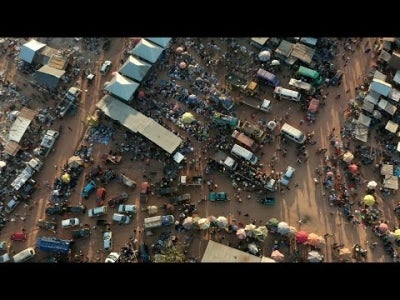
As it drives through the pristine, waste-free streets of Indore, India, the small garbage truck is impossible to miss. Behind its bright yellow cabin, the vehicle’s rear compartments are a patchwork of six vibrant colors reminiscent of a pop art painting. Labels clearly indicate that each colored compartment is dedicated to a different form of household waste.
Even without seeing the eye-catching array of colors, residents down the street already know to expect the garbage truck’s arrival before it turns into the neighborhood. For years, thanks to guidance from government officials and campaigners, each of the households in this “zero-waste” ward has committed to sorting its rubbish into categories, says Tanya Mukherjee, a consultant with the city.
“Indore has understood that the heart and soul of (environmentally sustainable) waste management is segregated collection at source,” Mukherjee says. “If you can transport waste in a segregated manner, you don't need extra resources or space to store and process it. You won't put your workers’ dignity, their safety at risk.”
Segregated waste collection is just one part of an intricate web of zero-waste initiatives that has helped Indore remain India’s cleanest city for six years in a row. The city employs some 15,000 people in waste management. Through education and training systems, robust household composting initiatives, financing, technologically advanced processing plants, and more, Mukherjee said Indore has “taken back control” of the waste crisis that once afflicted it.
For environmental campaigners, Indore is a shining example of how cities can counter what they call one of the gravest threats to the planet: a torrent of trash.
Every year, humanity produces more than 2 billion metric tons of municipal solid waste, of which 45 percent is not managed in controlled facilities. Without urgent action, this will rise to nearly 4 billion metric tons by 2050.
Waste – including plastic packaging, food, clothes, electronics, and debris from mining and construction sites – leads to disastrous consequences for human health and the economy and aggravates the triple planetary crisis of climate change, nature and biodiversity loss, and pollution. It disproportionately affects the poor, and up to 4 billion people lack access to proper waste disposal.
March 30, 2023 marks the inaugural International Day of Zero Waste. Facilitated by the United Nations Environment Programme (UNEP) and the UN Human Settlements Programme (UN-Habitat), the day promotes zero-waste initiatives and highlights how they can reduce resource use and produce less waste and pollution at all stages of a product’s life cycle to advance sustainable development.
“Zero Waste Day is about finding innovative solutions to the scourge that is waste and moving towards a more sustainable future that protects the environment and improves human health,” says Sheila Aggarwal-Khan, Director of the Industry and Economy division at UNEP. “To achieve this, governments must ensure that less waste is produced through products that stay in the economy, and then, where waste is produced, it is turned into a resource that can be fed back into the economy. Governments can create the enabling environment for responsible production and consumption patterns to advance the shift towards a circular economy.”
What is zero waste?
Zero waste is shorthand for efforts to reduce, reuse, redesign, and recycle, to throw away less by making better use of what humanity produces and to design products that don’t end up as waste, especially after just a single use. The benefits of zero waste include clean seas and fresh air, fertile soils and sanitary cities, and resilient economies and sustainable extraction.
This is a key component of circularity, which is the concept that the potential waste a product generates by the end of its life is considered at the point of manufacture. A circular economy involves the reduction and minimization of waste throughout product life cycles.
Zero waste requires action from all stakeholders – including governments, civil society, businesses, academia, communities, women, and youth, says Aggarwal-Khan.
UNEP has long worked to help countries tackle their waste problem.
In Nigeria, a UNEP-led project funded by the Global Environment Facility has driven ground-breaking legislation that holds manufacturers financially and legally responsible for pollution that their products create. The soon-to-be-concluded three-year, $15 million project has been a boon for Nigeria’s often risky and informal e-waste processing industry, which employs 100,000 people.
The project has helped to create formal e-waste collection centers, provide personal protective equipment to workers and support improved education for government officials, value-chain workers, and informal workers. It has also helped waste collectors and informal pickers safely extract valuable resources from 300 metric tons of electronic waste so far.
“Reducing waste requires action at all levels, and it’s critical we equip governments, industry, and consumers with the knowledge to make informed decisions to appropriately manage their waste,” says Ludovic Bernaudat, Head of the Knowledge and Risk Unit in UNEP’s Chemicals and Health Branch. “It’s important we do not sideline informal waste-pickers, who rely on waste for their livelihoods and bare the brunt of global waste streams.”
Governments can bolster effective e-waste management by requiring manufacturers and sellers to reuse electronics at the end of their life cycles and establishing consumers’ right to repair products, experts say.
UNEP and the GEF are also supporting the governments of Bangladesh, Indonesia, Pakistan, and Viet Nam to spearhead the movement to tackle waste in the global textiles industry through a five-year, $43-million program.
The four big clothes-producing countries are strengthening regulations and help their manufacturers – which employ 10 million people and produce 15 percent of global clothing exports – to reduce the use of hazardous chemicals in bleaching, dyeing, and other forms of textile processing.
The program will bring public policy up to the standards of international best practice and equip companies with the tools and know-how to better manage hazardous chemicals, protect their workers, and reduce the leakage of toxic “forever chemicals,” a family of approximately 12,000 synthetic chemicals.
Globally, innovations to manufacturing and dyeing are needed to address the textile industry’s high resource use, while new technologies must be developed to improve reuse, upcycling, and recycling when materials reach their end-of-life stage, according to a 2020 UNEP report.
As well, UN-Habitat has helped cities improve their waste management through Waste Wise Cities and the African Clean Cities Platform. More than 400 cities and 60 partners have joined these networks and committed to improving waste management and advocating for zero-waste good practices.
The Waste Wise Cites Tool has supported the development of comprehensive waste management plans and tangible projects in cities around the world since its launch in 2021. This includes a $7-million project to improve municipal solid waste management in 13 coastal cities in Lebanon, a nine-city project in the Dominican Republic and a $3 million project in Dar es Salaam, Tanzania. Data from the tool also helped inform the global estimate of SDG indicators 11.6.1, which provides important information and insights on the transition towards zero waste at global, national, and local levels.
With the impacts of waste mounting, communities have also turned to zero-waste initiatives. La Pintana, an urban municipality located south of Santiago, Chile, has successfully run a community program to manage organic waste since 2005. Through the project, residents in the municipality separate food at the household level, enabling approximately 36 metric tons of organic waste to be composted per day and saving the municipality $750 daily.
Celebrating Zero Waste Day
Türkiye, which put forward the resolution establishing the International Day of Zero Waste alongside 105 other countries, is among the leaders of the zero-waste movement.
Through its zero-waste project launched in 2017, the government provides support for the establishment of zero-waste management systems across all 81 provinces. The project has helped recover 33 million tonnes of recyclable waste, including 20 million tonnes of paper and cardboard and 5 million metric tons of plastic. This has resulted in about 62 billion Turkish lira ($3.3 billion) in economic gain and savings in energy and water use and storage space.
“Habits have begun to change with population growth, urbanization, industrialization and technology, (meaning) urgent measures should be taken,” says Şule Bektaş, a branch manager in the Ministry of Environment of Türkiye.
“Zero waste is about redesigning our systems and changing our habits so that all resources are used sustainably. We aim to … leave a clean and developed Türkiye and a livable world to future generations.”
As the world celebrates the first International Day of Zero Waste, experts hope that promoting zero-waste initiatives and highlighting the waste crisis can inspire action globally.
“Zero Waste Day is an opportunity to rethink our consumption style, refuse wastefulness, find values for reuse and recycle materials,” says Andre Dzikus, Chief of Urban Basic Services of UN-Habitat. “Let us think how we and our society can be waste-wise on this day.”
International Day of Zero Waste, observed for the first time on March 30, 2023 and jointly facilitated by UNEP and UN-Habitat, aims to raise awareness of the importance of responsible consumption and production practices and urban waste management. The day calls for rethinking humanity’s waste-related practices and for embracing a circular economy, which means reducing resource use and emissions to the environment throughout all stages of a product’s life cycle. This is considered key to addressing the triple planetary crisis of climate change, nature and biodiversity loss, and pollution and waste.
This story was originally published by UNEP.


